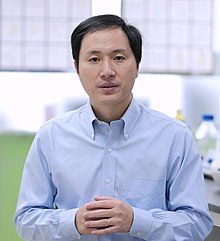He Jiankui | |||||||||
|---|---|---|---|---|---|---|---|---|---|
| 贺建奎 | |||||||||
 He in 2018 | |||||||||
| Born | 1984 (age 39–40) Xinhua County, Hunan, China | ||||||||
| Alma mater | University of Science and Technology of China (BS) Rice University (PhD) | ||||||||
| Known for | He Jiankui affair | ||||||||
| Scientific career | |||||||||
| Fields | Biophysics | ||||||||
| Institutions | Southern University of Science and Technology | ||||||||
| Thesis | Spontaneous Emergence of Hierarchy in Biological Systems (2011) | ||||||||
| Doctoral advisor | Michael W. Deem | ||||||||
| Other academic advisors | Stephen Quake[1] | ||||||||
| Chinese name | |||||||||
| Simplified Chinese | 贺建奎 | ||||||||
| Traditional Chinese | 賀建奎 | ||||||||
| |||||||||
He Jiankui ([xɤ̂ tɕjɛ̂nkʰwěɪ]; 贺建奎; born 1984) is a Chinese biophysicist. He was named as the inaugural director of the Institute of Genetic Medicine at Wuchang Technical College, a private undergraduate college in Wuhan, in September 2023.[2] Before January 2019, He served as associate professor at the Department of Biology of the Southern University of Science and Technology (SUSTech) in Shenzhen, Guangdong, China.[3][4][5] Earning a PhD from Rice University in Texas on protein evolution, including that of CRISPR, He learned gene-editing techniques (CRISPR/Cas9) as a postdoctoral researcher at Stanford University in California.[6]
In November 2018, He announced that he had created the first human genetically edited babies,[7][8] twin girls who were born in mid-October 2018 and known by their pseudonyms, Lulu and Nana.[9][10][6][1] The announcement was initially praised in the press as a major scientific advancement.[11] But following scrutiny on how the experiment was executed, He received widespread condemnation.[6][12][13] His research activities were suspended by the Chinese authorities on 29 November 2018,[14] and he was fired by SUSTech on 21 January 2019.[15] On 30 December 2019, a Chinese district court found He Jiankui guilty of illegal practice of medicine, sentencing him to three years in prison with a fine of 3 million yuan.[16] He was released from prison in April 2022.[17]
He was listed as one of Time's 100 most influential people of 2019, in the section "Pioneers".[18] At the same time he was variously referred to as a "rogue scientist",[19] "China's Dr. Frankenstein",[20] and a "mad genius".[21]
- ^ a b Bulluck, Pam (14 April 2019). "Gene-Edited Babies: What a Chinese Scientist Told an American Mentor". The New York Times. Retrieved 14 April 2019.
- ^ "武昌理工学院成立基因药物研究所". hb.people.com.cn. Retrieved 20 September 2024.
- ^ Cohen, Jon (1 August 2019). "The untold story of the 'circle of trust' behind the world's first gene-edited babies". Science. doi:10.1126/science.aay9400. Archived from the original on 13 October 2021. Retrieved 1 August 2019.
- ^ "Jiankui He(Nonpaid Leave)- Department of Biology". bio.sustc.edu.cn. Archived from the original on 2 January 2019. Retrieved 6 December 2018.
- ^ Rana, Preetika (10 May 2019). "How a Chinese Scientist Broke the Rules to Create the First Gene-Edited Babies - Dr. He Jiankui, seeking glory for his nation and justice for HIV-positive parents, kept his experiment secret, ignored peers' warnings and faked a test (Paywall)". The Wall Street Journal. Archived from the original on 5 April 2023. Retrieved 11 May 2019.
- ^ a b c Begley, Sharon; Joseph, Andrew (17 December 2018). "The CRISPR shocker: How genome-editing scientist He Jiankui rose from obscurity to stun the world". Stat News. Archived from the original on 17 December 2018. Retrieved 17 December 2018.
- ^ Cite error: The named reference
NYT-20190128was invoked but never defined (see the help page). - ^ "The scientist who created CRISPR babies is on Time's most-influential list—but not in a good way". MIT Technology Review. 18 April 2019. Archived from the original on 18 April 2019. Retrieved 18 April 2019.
- ^ Begley, Sharon (28 November 2018). "Amid uproar, Chinese scientist defends creating gene-edited babies". STAT News. Archived from the original on 31 January 2019. Retrieved 29 November 2018.
- ^ 复盘贺建奎的人生轨迹:是谁给了他勇气 (in Chinese). sina.com.cn. 27 November 2018. Archived from the original on 28 November 2018. Retrieved 28 November 2018.
- ^ Li, Jing-ru; Walker, Simon; Nie, Jing-bao; Zhang, Xin-qing (2019). "Experiments that led to the first gene-edited babies: the ethical failings and the urgent need for better governance". Journal of Zhejiang University Science B. 20 (1): 32–38. doi:10.1631/jzus.B1800624. PMC 6331330. PMID 30614228.
- ^ Cite error: The named reference
NYT-20181205was invoked but never defined (see the help page). - ^ Dvorsky, George (30 April 2019). "Substandard, Superficial, and Absurd: Experts Slam the Science Behind the CRISPR Baby Experiment". Gizmodo. Archived from the original on 30 April 2019. Retrieved 30 April 2019.
- ^ Jiang, Steven; Regan, Helen; Berlinger, Joshua (29 November 2018). "China suspends scientists who claim to have produced first gene-edited babies". CNN News. Archived from the original on 29 November 2018. Retrieved 30 November 2018.
- ^ Cite error: The named reference
Reuters-20190121was invoked but never defined (see the help page). - ^ ""基因编辑婴儿"案贺建奎已释放,曾获刑三年". finance.sina.com.cn. 7 April 2022. Retrieved 20 September 2024.
- ^ "The creator of the CRISPR babies has been released from a Chinese prison". 4 April 2022. Archived from the original on 23 July 2022. Retrieved 7 April 2022.
- ^ Doudna, Jennifer (18 April 2019). "100 Most Influential People - He Jiankui". Time. Archived from the original on 17 March 2021. Retrieved 18 April 2019.
- ^ Cohen, Jon (2 August 2019). "Inside the circle of trust". Science. 365 (6452): 430–437. Bibcode:2019Sci...365..430C. doi:10.1126/science.365.6452.430. PMID 31371593.
- ^ Yan, Sophia (28 November 2018). "China's 'Dr Frankenstein' says second woman in early pregnancy with gene-edited babies". The Telegraph. Retrieved 10 January 2020.
- ^ Low, Zoe (27 November 2018). "China's gene editing Frankenstein had dreams of being Chinese Einstein". South China Morning Post. Archived from the original on 10 January 2020. Retrieved 10 January 2020.